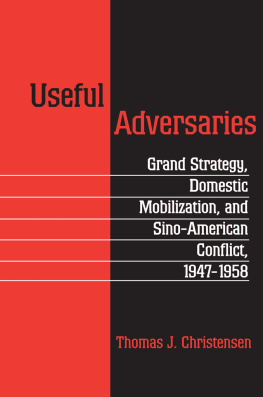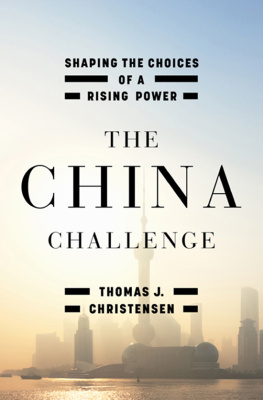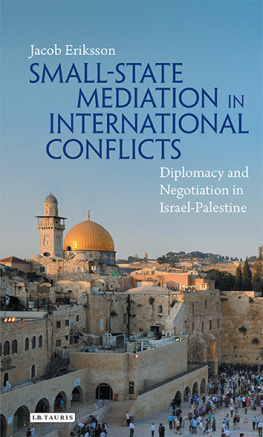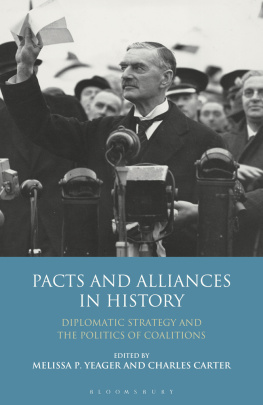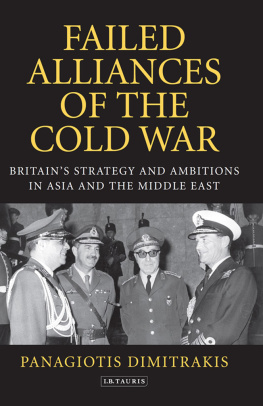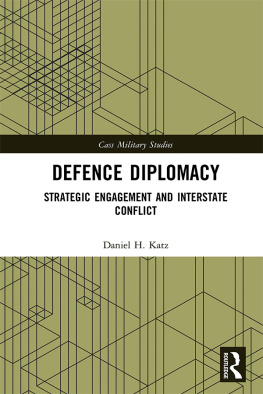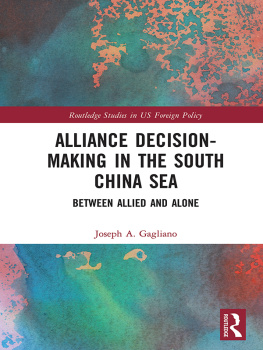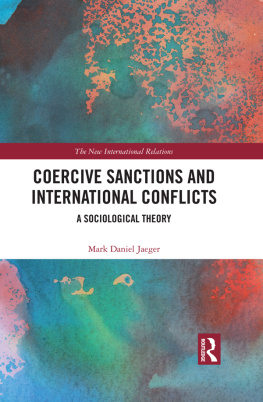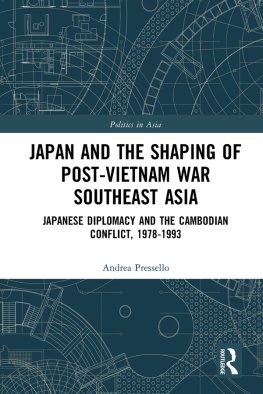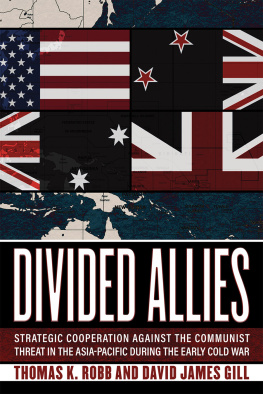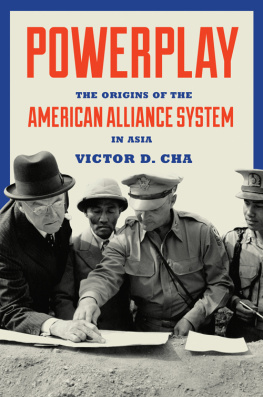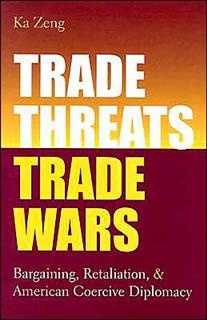WORSE THAN A MONOLITH
PRINCETON STUDIES IN INTERNATIONAL HISTORY AND POLITICS
Series Editors G. John Ikenberry and Marc Trachtenberg
Recent Titles
Worse Than a Monolith: Alliance Politics and Problems of Coercive Diplomacy in Asia by Thomas J. Christensen
Politics and Strategy: Partisan Ambition and American Statecraft by Peter Trubowitz
The Clash of Ideas in World Politics: Transnational Networks, States, and Regime Change, 15102010 by John M. Owen IV
How Enemies Become Friends: The Sources of Stable Peace by Charles A. Kupchan
1989: The Struggle to Create PostCold War Europe by Mary Elise Sarotte
The Struggle for Power in Early Modern Europe: Religious Conflict, Dynastic Empires, and International Change by Daniel H. Nexon
Strong Borders, Secure Nation: Cooperation and Conflict in Chinas Territorial Disputes by M. Taylor Fravel
The Sino-Soviet Split: Cold War in the Communist World by Lorenz M.Luthi
Nuclear Logics: Contrasting Paths in East Asia and the Middle East by Etel Solingen
Social States: China in International Institutions, 19802000 by Alastair Iain Johnston
Appeasing Bankers: Financial Caution on the Road to War by Jonathan Kirshner
The Politics of Secularism in International Relations by Elizabeth Shakman Hurd
Unanswered Threats: Political Constraints on the Balance of Power by Randall L. Schweller
Producing Security: Multinational Corporations, Globalization, and the Changing Calculus of Conflict by Stephen G. Brooks
Driving the Soviets up the Wall: Soviet-East German Relations, 19531961 by Hope M. Harrison
Legitimacy and Power Politics: The American and French Revolutions in International Political Culture by Mlada Bukovansky
Rhetoric and Reality in Air Warfare: The Evolution of British and American Ideas about Strategic Bombing, 19141945 by Tami Davis Biddle
Revolutions in Sovereignty: How Ideas Shaped Modern International Relations by Daniel Philpott
After Victory: Institutions, Strategic Restraint, and the Rebuilding of Order after Major Wars by G. John Ikenberry
Stay the Hand of Vengeance: The Politics of War Crimes Tribunals by Gary Jonathan Bass
War and Punishment: The Causes of War Termination and the First World War by H. E. Goemans
Copyright 2011 by Princeton University Press
Published by Princeton University Press, 41 William Street, Princeton, New Jersey 08540 In the United Kingdom: Princeton University Press, 6 Oxford Street, Woodstock, Oxfordshire OX20 1TW
press.princeton.edu
All Rights Reserved
Library of Congress Cataloging-in-Publication Data
Christensen, Thomas J., 1962
Worse than a monolith : alliance politics and problems of coercive diplomacy in Asia /
Thomas J. Christensen.
p. cm. (Princeton studies in international history and politics)
Includes bibliographical references and index.
ISBN 978-0-691-14260-9 (hardcover : alk. paper) ISBN 978-0-691-14261-6 (pbk. : alk. paper)
1. AsiaForeign relations1945-2. AlliancesHistory20th century. I. Title.
DS35.2.C47 2011
327.5dc22
British Library Cataloging-in-Publication Data is available
This book has been composed in Minion
Printed on acid-free paper. $$
Printed in the United States of America
10 9 8 7 6 5 4 3 2 1
Acknowledgments
This book has been several years in the making. The research and writing process was interrupted by many other research projects, two family moves, and a public service leave during which I served as Deputy Assistant Secretary of State for East Asian and Pacific Affairs. The views expressed in the book are purely my own and do not represent the views of the U.S. government or the U.S Department of State. Certain sections of the book are culled from articles that appeared in the journals Asian Security (vol. 1, no. 1, January 2005) and International Security (vol. 23, no. 4, spring 1999).
For comments and research assistance, I am grateful to David Bachman, Gary J. Bass, Yan Bennett, Chen Jian, Chen Zhiming, Ja Ian Chong, Milton Esman, Taylor Fravel, Aaron Friedberg, Lily Fu, Michael Glosny, James Goldgeier, Avery Goldstein, Steven Goldstein, Todd Hall, Hope Harrison, Yinan He, Serene Hung, Samuel P. Huntington, Robert Jervis, Alastair Iain Johnston, Peter Katzenstein, Carl Kaysen, Andrew Kennedy, Jonathan D. Kirshner, Li Danhui, Li Hong, Adam Liff, Jennifer Lind, Liu Dongsheng, Oriana Mastro, Niu Jun, Barry Posen, Lucian Pye, Alan Romberg, Stephen Peter Rosen, Robert Ross, Richard Samuels, Randall Schweller, Adam Segal, Shen Zhihua, Jack L. Snyder, Christopher Twomey, Stephen Van Evera, Lynn White, Allen Whiting, Xu Xin, Dali Yang, Suisheng Zhao, two anonymous reviewers, the department of Politics at Princeton University, the faculty and fellows at the Security Studies Program at MIT, the helpful staff at the Ministry of Foreign Affairs Archives in Beijing, and my many students in Chinas Foreign Relations and International Relations of East Asia at Cornell, Princeton, and MIT. Chuck Myers at Princeton University Press has been an enormous source of ideas, encouragement, and editorial suggestions. It is easy to see why the press is a leader in the field. Linda Truilo and Terri OPrey did a very fine job editing the final manuscript for the Press. I also thank the independent editor Jennifer Camille Smith for offering expert advice even when she was very busy and for motivating me to move this from draft manuscript to final product. I am grateful to the Smith Richardson Foundation for financial support for my archival research in China in 2004. I apologize to all of those many people who helped me over the years but whom I neglected to mention here.
The book is dedicated to my family: my wife, Barbara Edwards, my daughter Theresa, and my son, William. They have been a fountain of joy, support, and inspiration, especially while I was away from home in Washington wrestling with some of the policy issues discussed in the latter part of this book.


